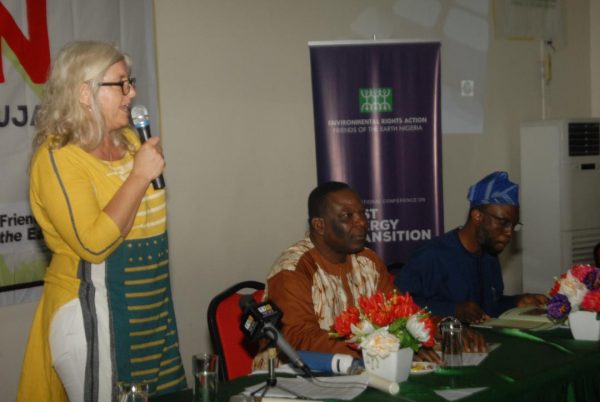The Environmental Rights Action/Friends of the Earth Nigeria (ERA/FoEN) organised an international conference on Just Energy Transition from 2-3 November 2018 at the Reiz Continental Hotel in Abuja.
The convergence brought together civil society and community groups on the Friends of the Earth International (FoEI) platform, and government officials and community-based groups from Nigeria, who brainstormed on the challenges posed by fossil fuels dependency and the need for a paradigm shift within the framework of a post-petroleum economy.
In his opening remarks, Executive Director of ERA/FoEN, Dr. Godwin Uyi Ojo, said that carbon economy is ruining the world and leading to environmental degradation, increasing social inequalities and exclusion, while over-consumption continues unabated in rich and industralised countries to the detriment of the African continent.
During the meeting participants noted that even within the context of demands for renewable energy in Africa, there was a new energy colonialism which is skewed in favour of the developed nations and replicating already existing inequalities in energy access hence the need for energy democracy which will be indigenous and critical for development.
At the end of the robust two-day engagements, participants noted the following:
OBSERVATIONS
- Fossil fuels extraction is still aggressively ongoing in Nigeria and across Africa to the detriment of the local communities and sacredness of the environment on the continent
- Due to ever-increasing energy needs of industries in the developed and emerging economies, African countries carry the burden of massive extraction of raw materials and its impact on the environment, health and livelihoods
- There is a dearth of funding from donor agencies for research into alternative energy sources that are indigenous to Africa. Instead, the World Bank and global financial institutions continue to invest in energy projects that have adverse effects on energy development on the continent.
- Energy policies in Nigeria and across Africa are deficient, lack community perspectives and the political will to follow through implementation of good policies. In Nigeria for example, there is still no Renewable Energy Framework in place that recognizes the roles of state and non-state actors in renewable energy development.
- Most private investors in energy systems in Africa are more interested in profits than actually bridging the energy deficit. Because of this, Africa has become a dumping ground for fake and substandard alternative energy products coming from the developed world in addition to their export of dirty energy to the African continent.
- Women and other critical groups have been largely excluded in the fashioning of policies related to renewable and access to energy in general
- Civil society and other groups advocating alternatives to fossil fuels in the global North and the global South still work at cross purposes
- There is a dearth of information on energy issues in the media thus deepening public ignorance and inhibiting contribution to solutions
Participants therefore demanded that:
- Nigeria and other African governments stop new fossil fuel extraction and divest funding, loans and subsidies from fossil fuel development and channel same to renewable sources of energy.
- African governments prioritise national and community energy needs over global economic models that promote inequalities.
- African governments go beyond mere words by allocating substantial per cent of their annual income to funding for research and development of alternative energy sources such as solar, wind and biomass, among others.
- African governments embrace and promote decentralized alternative energy with a focus on renewables that are affordable and environment- friendly. Clean and safe community alternative energy models should be vigorously pursued to deliver on community energy needs that are off-grid and mini-grids.
- African governments put in place appropriate institutional infrastructure and frameworks to support expanding energy supply and access and their sustainability.
- Access to energy must not be driven by capitalists but seen as a right with people power, citizens and vulnerable groups involved in the shaping of local renewable energy solutions
- There is need for zero tariffs on renewable energy products to allow greater energy access to local communities. Support should come in form of grants, loans and subsidies beyond exploitative enterprise models to local communities and workers in transitioning from fossil fuels to green economy
- Civil society and groups working on alternatives to fossil fuels in the global North and South work in synergy so that the goal of a Just transition can be met at the soonest
- Media deepen the understanding of energy issues as well as the struggles against environmental and climate injustices.













